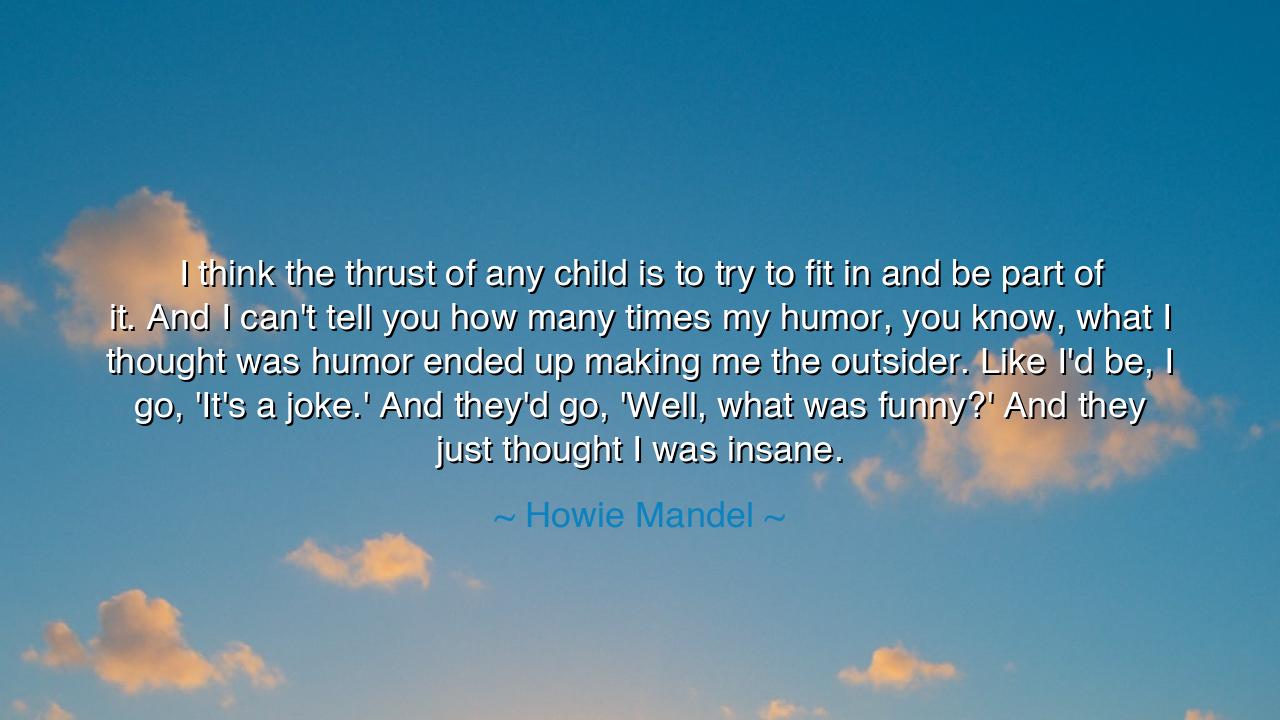
I think the thrust of any child is to try to fit in and be part
I think the thrust of any child is to try to fit in and be part of it. And I can't tell you how many times my humor, you know, what I thought was humor ended up making me the outsider. Like I'd be, I go, 'It's a joke.' And they'd go, 'Well, what was funny?' And they just thought I was insane.






When Howie Mandel reflected, “I think the thrust of any child is to try to fit in and be part of it. And I can’t tell you how many times my humor, you know, what I thought was humor ended up making me the outsider. Like I’d be, I go, ‘It’s a joke.’ And they’d go, ‘Well, what was funny?’ And they just thought I was insane,” he spoke from the deep well of human experience—the longing for belonging, and the pain of being misunderstood. His words are not only about comedy; they are about the fragile balance between the desire to connect and the courage to be different. Through this reflection, Mandel reminds us that creativity, individuality, and even madness often walk hand in hand—and that the path of originality is rarely understood by the crowd.
The origin of this quote lies in Mandel’s youth, and in his lifelong relationship with humor as both shield and sword. Before he became a celebrated comedian and entertainer, he was a child who saw the world through an unusual lens. What others saw as ordinary, he saw as absurd; what others feared, he often turned into laughter. Yet in those early years, his wit—sharp, unpredictable, unconventional—set him apart rather than bringing him closer. Like many great humorists before him, Mandel discovered that the gift of seeing differently can also be a burden, for the mind that perceives truth in laughter often speaks a language the world has yet to learn.
The child’s thrust to fit in, as he calls it, is one of the most ancient impulses in humanity. From the dawn of time, the tribe was safety, and the outsider was peril. We learn to mirror others, to speak as they speak, to hide the parts of ourselves that might draw ridicule. Yet in that very act of conformity, something sacred begins to dim—the light of originality, the courage of the unique soul. Mandel’s story is the story of every thinker, artist, or dreamer who has tried to belong, only to realize that belonging sometimes demands the sacrifice of authenticity. The laughter that made others uncomfortable was, in truth, his spirit’s way of saying, “I see differently.”
History is rich with examples of those who, like Mandel, were misunderstood for their vision. Consider Vincent van Gogh, whose paintings of swirling skies and trembling stars were dismissed in his lifetime as the work of madness. He, too, longed to be accepted, to have his art understood, yet the world could not yet see through his eyes. What they called insanity was, in truth, the cry of a soul that saw beauty too intensely for ordinary sight. So it is with the humorist, the poet, and the inventor: each sees what others cannot, and in expressing it, becomes the outsider—until time catches up to their vision.
Mandel’s reflection also carries a quiet wisdom about humor itself. Humor, at its heart, is an act of revelation. It exposes the absurd, the hidden, the uncomfortable truths we dare not speak plainly. But to those who do not share the vision—to those whose minds remain bound by convention—such laughter seems strange, even threatening. The ancients knew this power well: jesters and fools were once sacred figures, permitted to speak truths kings feared to hear. The fool’s madness was divine, his laughter the medicine of the soul. In Mandel’s experience, we glimpse that same ancient paradox: the fool is both shunned and needed, mocked and essential.
Yet there is great beauty in this pain. For the one who is misunderstood stands closer to the mystery of creation itself. When the crowd recoils from the unfamiliar, the brave soul presses on, trusting that meaning will emerge in time. To be an outsider is not to be lost—it is to be ahead. Mandel’s youthful alienation became, in time, his greatest strength. What once made him strange became the very thing that made him celebrated. His humor—raw, unexpected, unconventional—taught the world to laugh in new ways. And in that laughter, he finally found the connection he sought all along.
So, let this teaching stand as both comfort and challenge: do not fear being misunderstood. The world may not laugh when you laugh, nor see as you see—but your difference is your gift. The crowd’s confusion is proof that you are bringing something new into being. If your humor, your art, your way of thinking feels “out of left field,” do not silence it; cultivate it. For it is often the “insane” who lead the rest toward sanity, the jesters who speak the truth kings dare not utter.
And thus, remember Howie Mandel’s wisdom: “I just wanted to fit in, but my humor made me the outsider.” These words, spoken in reflection, carry the eternal truth that belonging is not always the highest virtue. It is better to be true and alone than false and adored. Stand firm in your strangeness. Laugh when others frown. Speak even when your words seem foreign. For the day will come when your laughter, once misunderstood, becomes the song that frees others from their silence—and then, at last, you will find that you have always belonged.






AAdministratorAdministrator
Welcome, honored guests. Please leave a comment, we will respond soon